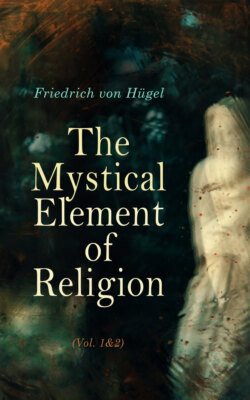Читать книгу The Mystical Element of Religion (Vol. 1&2) - Friedrich von Hügel - Страница 35
На сайте Литреса книга снята с продажи.
IV. Summing up: Hellenism or Harmonization, Christianity or Spiritual Experience, and Science or Acceptance of a Preliminary Mechanism, all three necessary to Man.
ОглавлениеTo sum up all this first chapter, we have got so far as this. We have seen that humanity has, so far, found and worked out three forces and conceptions of life, forces which are still variously operative in each of us, but which find their harmonious interaction in but few men, their full theoretical systematization in none.[33]
There is the ancient, Greek contribution, chiefly intellectual and aesthetic, mostly cold and clear, quick and conclusive, with, upon the whole, but a slight apprehension of personality and freedom, of conscience and of sin, and little or no sense of the difference and antagonism between these realities and simply Mathematical, Mechanical laws and concepts. It is a view profoundly abstract, and, at bottom, determinist: the will follows the intellect necessarily, in exact proportion to the clearness of information of the former. And the strength of this view, which was possible even to that gifted race just because of the restrictedness of its knowledge concerning the length and breadth of nature and of history, and still more with regard to the depths of the human character and conscience, consists in its freshness, completeness, and unity. And this ideal of an ultimate harmonization of our entire life and of its theory we must never lose, more and more difficult though its even approximate realization has of necessity become.
There is next the middle, Christian contribution, directly moral and religious, deep and dim and tender, slow and far-reaching, immensely costly, infinitely strong; with its discovery and exemplification of the mysterious depth and range and complexity of human personality and freedom, of conscience and of sin; a view profoundly concrete and at bottom libertarian. The goodwill here first precedes, and then outstrips, and determines the information supplied by the intellect: “Blessed are the clean of heart, for they shall see God.” And the strength of this position consists in its being primarily not a view, but a life, a spiritual, religious life, requiring, implying, indeed proclaiming, definite doctrines concerning God and man, and their relations to each other, but never exhausted by these doctrines even in their collectivity, inexhaustible though these in their turn are by their union with the life of the spirit, their origin and end.
There is finally the modern, Scientific contribution, intensely impersonal and determinist, directly neither metaphysical nor religious, but more abstract even than the Greek view, in the mathematical constituent of its method, and more concrete in a sense than Christianity itself, in the other, the sensible-experiment constituent of its method. The most undeniable of abstractions, those of mathematics, (undeniable just because of their enunciation of nothing but certain simplest relations between objects, supposing those objects to exist,) are here applied to the most undeniable of concretions, the direct experiences of the senses. And this mysterious union which, on the surface, is so utterly heterogeneous, is itself at all explicable only on mental, metaphysical assumptions and on the admission of the reality and priority of Mind. It is a union that has turned out as unassailable in its own province, as it is incapable of suppressing or replacing the wider and deeper truths and lives discovered for us respectively by Hellenism and Christianity.
Only in the case that man could but reckon mathematically and observe with his senses, or in the case that man were indeed provided with other faculties, but that he found Reality outside him and within him to be properly apprehensible by the mathematico-experimental process alone, could there be any serious question of such a final suppression of by far the greater and deeper portion of himself. Instead of any such deadlock the facts of these last four centuries bear out the contention that neither can the religious life suppress or do without the philosophical and the scientific, nor can either of these other two lives suppress or permanently do without its fellow or without religion.
But all this and its detailed practical application will, I trust, become much clearer as we proceed.
